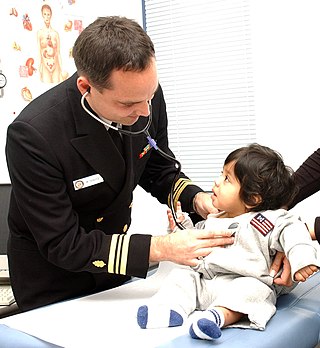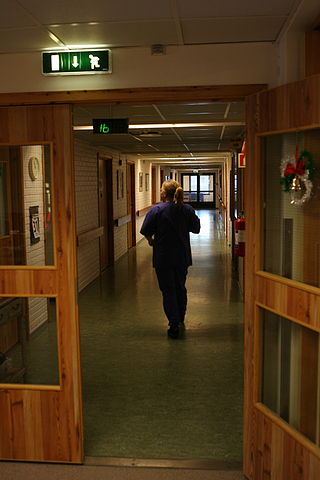
A registered nurse (RN) is a nurse who has graduated or successfully passed a nursing program from a recognized nursing school and met the requirements outlined by a country, state, province or similar government-authorized licensing body to obtain a nursing license. An RN's scope of practice is determined by legislation, and is regulated by a professional body or council.
The Bachelor of Science in Nursing also known in some countries as a Bachelor of Nursing (BN) or Bachelor of Science (BS) with a Major in Nursing is an academic degree in the science and principles of nursing, granted by an accredited tertiary education provider. The course of study is typically three or four years. The difference in degree designation may relate to the amount of basic science courses required as part of the degree, with BScN and BSN degree curriculums requiring completion of more courses on math and natural sciences that are more typical of BSc degrees and BN curriculums more focused on nursing theory, nursing process, and teaching versions of general science topics that are adapted to be more specific and relevant to nursing practice. Nursing school students are generally required to take courses in social and behavioral sciences and liberal arts, including nutrition, anatomy, chemistry, mathematics, and English. In addition to those courses, experience in physical and social sciences, communication, leadership, and critical thinking is required for a bachelor's degree. BSN programs typically last 2–4 years. Someone who holds a BSN can work in private or public medical and surgical hospitals, physician's offices, home health care services, and nursing facilities. Having a BSN can result in more opportunities and better salary than just an associate degree.
The American Nurses Association (ANA) is a 501(c)(6) professional organization to advance and protect the profession of nursing. It started in 1896 as the Nurses Associated Alumnae and was renamed the American Nurses Association in 1911. It is based in Silver Spring, Maryland and Jennifer Mensik Kennedy is the current president.
Nurse education consists of the theoretical and practical training provided to nurses with the purpose to prepare them for their duties as nursing care professionals. This education is provided to student nurses by experienced nurses and other medical professionals who have qualified or experienced for educational tasks, traditionally in a type of professional school known as a nursing school or college of nursing. Most countries offer nurse education courses that can be relevant to general nursing or to specialized areas including mental health nursing, pediatric nursing, and post-operative nursing. Nurse education also provides post-qualification courses in specialist subjects within nursing.
A licensed practical nurse (LPN), in much of the United States and Canada, is a nurse who provides direct nursing care for people who are sick, injured, convalescent, or disabled. In the United States, LPNs work under the direction of physicians, mid-level practitioners, and may work under the direction of registered nurses depending on their jurisdiction.

A nurse practitioner (NP) is an advanced practice registered nurse and a type of mid-level practitioner. NPs are trained to assess patient needs, order and interpret diagnostic and laboratory tests, diagnose disease, prescribe medications and formulate treatment plans. NP training covers basic disease prevention, coordination of care, and health promotion.
An advanced practice nurse (APN) is a nurse with post-graduate education and training in nursing. Nurses practicing at this level may work in either a specialist or generalist capacity. APNs are prepared with advanced didactic and clinical education, knowledge, skills, and scope of practice in nursing.
An Associate of Science in Nursing (ASN) is a tertiary education nursing degree which typically takes 2–3 years to complete. In the United States, this type of degree is usually awarded by community colleges or similar nursing schools. Some four-year colleges also offer this degree. Students awarded an Associate of Science in Nursing are qualified to sit for the NCLEX-RN and apply for licensure as a Registered Nurse.

Beverly Louise Malone is the chief executive officer of the National League for Nursing in the United States. Prior to assuming this position in February 2007 she served as general secretary of the Royal College of Nursing in the United Kingdom for six years.

The Frontier Nursing Service (FNS) provides healthcare services to rural, underserved populations since 1925, and educates nurse-midwives since 1939.

Nursing in the United States is a professional health care occupation. It is the largest such occupation, employing millions of certified professionals. As of 2023, 3,175,390 registered nurses were employed, paid a median income of $86,070.
The National League for Nursing (NLN) is a national organization for faculty nurses and leaders in nurse education. It offers faculty development, networking opportunities, testing services, nursing research grants, and public policy initiatives to more than 45,000 individual and 1,000 education and associate members.

A nursing shortage occurs when the demand for nursing professionals, such as Registered Nurses (RNs), exceeds the supply locally—within a healthcare facility—nationally or globally. It can be measured, for instance, when the nurse-to-patient ratio, the nurse-to-population ratio, the number of job openings necessitates a higher number of nurses than currently available, or the current number of nurses is above a certain age where retirement becomes an option and plays a factor in staffing making the workforce in a higher need of nurses. The nursing shortage is global according to 2022 World Health Organization fact sheet.

Gerontological nursing is the specialty of nursing pertaining to older adults. Gerontological nurses work in collaboration with older adults, their families, and communities to support healthy aging, maximum functioning, and quality of life. The term gerontological nursing, which replaced the term geriatric nursing in the 1970s, is seen as being more consistent with the specialty's broader focus on health and wellness, in addition to illness.
The Philippine Nurse Licensure Examination is a 500-item multiple choice exam to test basic nursing level competency which considers the objectives of the nursing curriculum, the broad areas of nursing and other related disciplines and competencies. It is held every June and December annually in various public schools throughout the Philippines. Room assignment for the exams are posted outside the Professional Regulation Commission building at least three days before the exam.

A family nurse practitioner (FNP) provides continuing and comprehensive healthcare for the individual and family across all ages, genders, diseases, and body systems. Primary care emphasizes the holistic nature of health and it is based on knowledge of the patient in the context of the family and the community, emphasizing disease prevention and health promotion.
Nursing in the Philippines is provided by professionally trained nurses, who also provide a quarter of the world's overseas nurses. Every year, some 20,000 nurses work in other countries. Nurses in the Philippines are licensed by the Professional Regulatory Commission. The advance of nursing in the Philippines as a career was pioneered by a culture of care that is intrinsic in the Filipino people. This began before Spanish colonization.
Nursing is the largest healthcare profession in the United States, with more than 3.1 million registered nurses. Between 2012 and 2022, employment for nurses is projected to grow by 19 percent, which is more than any other profession. Nurses make up the largest component of staff in hospitals but are also able to provide care in clinic settings, patient's homes, schools, nursing homes, public health agencies, and mental health centers. In addition, nurses can be found in the military, in industry, nursing education, and do health care research. Nurses in these various roles and settings can provide direct patient care and case management, but also develop and establish nursing practice and quality standards within complex healthcare systems. As each degree can provide a different level of care for patients and function in vastly different roles, it is important to differentiate between them. The levels of nursing degrees have different educational requirements, licensure, and credentialing that can vary state to state.

The graduate nurse (GN) is a nurse who has completed their academic studies but not completed the requirements to become a registered nurse (RN). Depending on the country, state, province or similar licensing body, the graduate nurse may be granted provisional nursing licensure. A graduate nurse has not yet passed the National Council Licensure Examination (NCLEX-RN) to become a registered nurse (RN).
Barbara L. Nichols is an American nurse leader and was the first black president of the American Nurses Association. A graduate of Case Western Reserve University and the University of Wisconsin–Madison, Nichols is a former CEO of CGFNS International, a past president of the Wisconsin Nurses Association and a Living Legend of the American Academy of Nursing.







